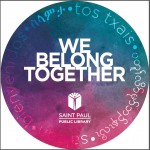This letter was originally sent to staff members of the Saint Paul Public Library on February 17, as a response to questions around the library’s role in facilitating discussions in the current political climate.
Dear colleagues and friends,
The current political atmosphere has given rise to uncertainty and concern for our democracy and for the welfare of all who call America home. Many of you have asked in meetings and in casual conversations: “How can w e help the public understand these issues?” “What can we do now?” “Do we have permission?” The answer to the latter is emphatically: Yes.
e help the public understand these issues?” “What can we do now?” “Do we have permission?” The answer to the latter is emphatically: Yes.
The Saint Paul Public Library administration fully supports all staff members in their efforts to promote democracy.
Consider the actions of our colleagues at libraries throughout the country who have displayed welcoming messages, created topical displays, and held civic events and talks on immigrant rights, fake news, and the principles of democracy. The Urban Libraries Council has compiled a comprehensive list of these endeavors, which I encourage you to review.
Such actions are fundamental to the work of libraries, as outlined in the American Library Association’s (ALA) Bill of Rights*. That document states that it is absolutely the library’s duty to uphold the values of freedom, equality, safety, and access to information. This applies to all people, regardless of age, origin, economics, background, citizenship, or views.
Our communities need SPPL now more than ever. We are purveyors of truth in an era of “fake news.” We are a safe space for dialogue related to current events. We inform patrons of basic civics and human rights. We promote literacy, digital inclusion, and access to information.
I applaud those of you who have already launched new programs or engagement activities around these topics and encourage all staff members to feel empowered by their work. With this message, I ask every library to take action and do one thing next week:
- Create a display that showcases immigrant authors.
- Talk to your patrons and neighborhood organizations ¾ offer our resources and ask them how SPPL can be of service.
- Make sure everyone who comes through the door is greeted with a smile.
Then, start laying the groundwork for what your library or team can do in the coming weeks and months. This is not a short-term call to action, but a long-term one as well.
We are making reasonable amounts of funding available for food, translation services, or other expenses through Perrie Jones or our community engagement grant. Contact Tony with your funding needs.
Share your stories: Email Phoebe with photos and anecdotes. We want to document displays, signs, and programs and hear how you help patrons with essential services such as finding and copying passports, citizenship papers, and other documents and obtaining legal, housing, and other support services.
Keep up the dialogue with your colleagues, partners, patrons, and community residents. This work will be ongoing; it is part of your community engagement work. Program committees and the racial equity change team will also take up this charge.
I will keep you apprised of system-wide initiatives, but it starts with you ¾ today. Lean on the ALA Bill of Rights, and look to SPPL’s vision:
“We are a cornerstone of a thriving city: welcoming people of all ages and cultures; strengthening neighborhoods and learning networks; and inspiring all with the world of ideas.”
– Jane Eastwood, Library Director
Saint Paul Public Library
The ALA’s Library Bill of Rights
The American Library Association affirms that all libraries are forums for information and ideas, and that the following basic policies should guide their services.
I. Books and other library resources should be provided for the interest, information, and enlightenment of all people of the community the library serves. Materials should not be excluded because of the origin, background, or views of those contributing to their creation.
II. Libraries should provide materials and information presenting all points of view on current and historical issues. Materials should not be proscribed or removed because of partisan or doctrinal disapproval.
III. Libraries should challenge censorship in the fulfillment of their responsibility to provide information and enlightenment.
IV. Libraries should cooperate with all persons and groups concerned with resisting abridgment of free expression and free access to ideas.
V. A person’s right to use a library should not be denied or abridged because of origin, age, background, or views.
VI. Libraries which make exhibit spaces and meeting rooms available to the public they serve should make such facilities available on an equitable basis, regardless of the beliefs or affiliations of individuals or groups requesting their use.
Adopted June 19, 1939, by the ALA Council; amended October 14, 1944; June 18, 1948; February 2, 1961; June 27, 1967; January 23, 1980; inclusion of “age” reaffirmed January 23, 1996.

